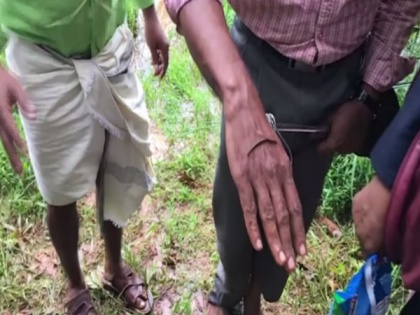Farmers in Kerala's Kozhikode village troubled with leech infestation in paddy fields
By ANI | Published: September 3, 2021 05:22 PM2021-09-03T17:22:22+5:302021-09-03T17:30:07+5:30
Farmers in Velom village of Kerala's Kozhikode are facing a tough time as many farmlands and paddy fields are witnessing leech infestations.

Farmers in Kerala's Kozhikode village troubled with leech infestation in paddy fields
Farmers in Velom village of Kerala's Kozhikode are facing a tough time as many farmlands and paddy fields are witnessing leech infestations.
A team of experts visited the village on Thursday to examine the problem and suggest solutions to farmers.
KM Sreekumar, Professor and HOD (Agricultural Entomology), Kerala Agricultural University (KAU) explained the reasons for the leech menace. "This is not a new problem. Actually, leeches were there already, previously. But, at that time, we were not having food. So farmers were ready to cultivate any field irrespective of whether there was a leech problem or not. Farmers were ready to withstand the leech problem, at that time. But now, when sufficient food is available, for instance, even if the farmers are not cultivating any crop, still they are getting enough rice, so farmers are just keeping the rice land fallow."
He further said, "In such fallow lands, the chances of leech problems will be higher because there is no soil disturbance. When we cultivate, the soil is disturbed and leeches are killed thus reducing their population. However, when cultivation is not taking place, chances of multiplication of leeches will be very very high. And, when cattle and other animals are kept for grazing, leeches get sufficient food. It is pertinent to note that, just a single blood meal is sufficient for leeches to survive for a year. Hence, slowly and steadily there was a noticeable increase in leeches when farmers started keeping the paddy land fallow."
"Also, previously we used to use deadly chemicals like endrin and aldrin but nowadays pesticides used are of very low toxicity which will not kill leeches Over the last two to three years the summer rainfall has increased. Whenever summer rains are high, the summer sleep of the leeches gets reduced which gives them more time for multiplication and mating," said Professor Sreekumar.
Speaking about the solutions, Professor Sreekumar said, "The best thing to control the menace of leeches is copper sulphate. The use of 1 kg of copper sulphate per hectare of paddy field having two inches of water. So, this copper sulphate can be applied in a powdered form, mixed along with sand or soil or it can be mixed with water and dissolved completely and then that solution can be spread in the field.
"Also, use of lime or quicklime i.e is calcium carbonate or calcium hydroxide. That will reduce the soil acidity and will also improve the growth of the crop as well as it will reduce the activities of the leeches," he added.
( With inputs from ANI )
Disclaimer: This post has been auto-published from an agency feed without any modifications to the text and has not been reviewed by an editor
Open in app